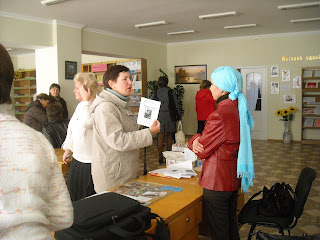Director of the Alushta Library, Tatiana, along with Gasprinskiy librarians Zarema and Elzira, on the Alushta waterfront.

The Central Library of Alushta.

Librarians at seminar in the Alushta Children's Library.

Nadjie talks about the Crimean Tatar language.

The new internet center of the Chernomorsky Library.

Last spring Nadjie (my counterpart at the library), and I applied for a grant from the Small Program Assistance program of the USAID administered through the Peace Corps. We received approximately $5000 to conduct a series of seminars for Crimean librarians on Crimean Tatar language, literature, and culture, with the goal of helping to promote ethnic understanding and tolerance in Crimea. In June we conducted a two-day seminar in Simferopol for twenty-five librarians from the central district libraries in Crimea—see the July 9th blog post for more information on this seminar. The librarians attending the June seminar found it very helpful—“A very interesting, useful, and informative seminar. I gathered a lot of new ideas and would like that such seminars were held more frequently,” said one participant.
A second phase of our grant is to conduct smaller seminars in regions around Crimea to be attended by staff from village libraries. On October 4th, we went to the central library in Chornomorske, a seaside town on the far western coast of Crimea, about a two-hour car trip from Simferopol. The enthusiastic director, Valentyna Kysil, was a gracious host, showing us around the central and children libraries, located next to one another. After the seminar, she also showed us the beautiful park and beach of Chornomorske, only a short walk from the library.
A few days later we went to Alushta, a town on the southern coast of Crimea. We also received a warm welcome there from library director, Tatiana Grigorievna, who gave us a tour of her library located in an historic mansion, and then the popular seaside boardwalk of Alushta.
For both seminars, two librarians came from Gasprinsky, along with Nadjie and me. The librarians talked about the resources of Gasprinsky—biographies of Crimean Tatar writers, bibliographies listing Crimean Tatar children books, traditions, and customs; bibliographies describing the books in the library collection published before the Deportation, and also books published during the czarist times by foreign travelers to Crimea. Also showcased were bibliographies of stories in Crimean Tatar language, a quarterly publication of new books in the library, and an annual calendar published by the library with Crimean Tatar traditions, religious holidays, and birth dates of famous Crimean Tatars. We also did a presentation on the displays and events in the Reading Room of the Gasprinsky Library, and I did a short talk and presentation about the role of a Peace Corps Volunteer in a library. Lastly, Nadjie, the leading methodologist at Gasprinsky, talked about the help Gasprinsky can provide to regional libraries in their work to open up their libraries to their Crimean Tatar communities. We ended the seminars with an exercise in cross cultural communication, with small groups translating a Russian proverb into Crimean Tatar and talking about the similarities—and differences—of the two cultures.
On a personal note, I found traveling to the regional libraries very rewarding. I have met some wonderful people and have come to appreciate even more the diverse physical and cultural beauty of Crimea. I look forward to the rest of this month as we make our way across the peninsula, visiting a library network that represents the over 700 libraries in Crimea.





















